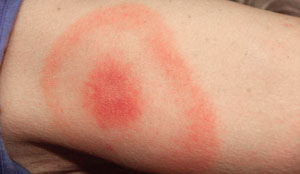Lyme disease
Lyme disease is prevalent in Dorset. You may be bitten by a tick on the walk or when recceing the walk. Where possible, keep to paths and avoid walking through deep vegetation. Keep covered up to make it harder for ticks to reach your skin. Check for ticks regularly and brush off any you see on your clothing before they have a chance to bite.
If you are bitten by a tick, don't panic. Most ticks do not carry the disease. Remove the tick as soon as possible, preferably using a tick removal tool. Watch out for symptoms of Lyme disease.
Symptoms

Bulls-eye rash
The classic symptom of the disease is a circular "bulls-eye rash", as shown in the picture. However, one in three cases of Lyme disease do not show the rash. Some people with Lyme disease also experience flu-like symptoms in the early stages, such as tiredness (fatigue), muscle pain, joint pain, headaches, a high temperature (fever), chills and neck stiffness.
More serious symptoms may develop several weeks, months or even years later if Lyme disease is left untreated or is not treated early on. These can include:
- pain and swelling in the joints (inflammatory arthritis)
- problems affectingthe nervous system – such as numbness and pain in your limbs, paralysis of your facial muscles, memory problems and difficulty concentrating
- heart problems – such as inflammation of the heart muscle (myocarditis) or sac surrounding the heart (pericarditis), heart block and heart failure
- inflammation of the membranes surrounding the brain and spinal cord (meningitis) – which can cause a severe headache, a stiff neck and increased sensitivity to light
When to see your GP
You should see your GP if you develop any of the symptoms described above after being bitten by a tick, or if you think you may have been bitten. Make sure you let your GP know if you've spent time in woodland or heath areas where ticks are known to live.
Diagnosing Lyme disease is often difficult as many of the symptoms are similar to other conditions. A spreading rash some days after a known tick bite should be treated with appropriate antibiotics without waiting for the results of a blood test.
Treating Lyme disease
If you develop symptoms of Lyme disease, you will normally be given a course of antibiotic tablets, capsules or liquid. Most people will require a two- to four-week course, depending on the stage of the condition.




